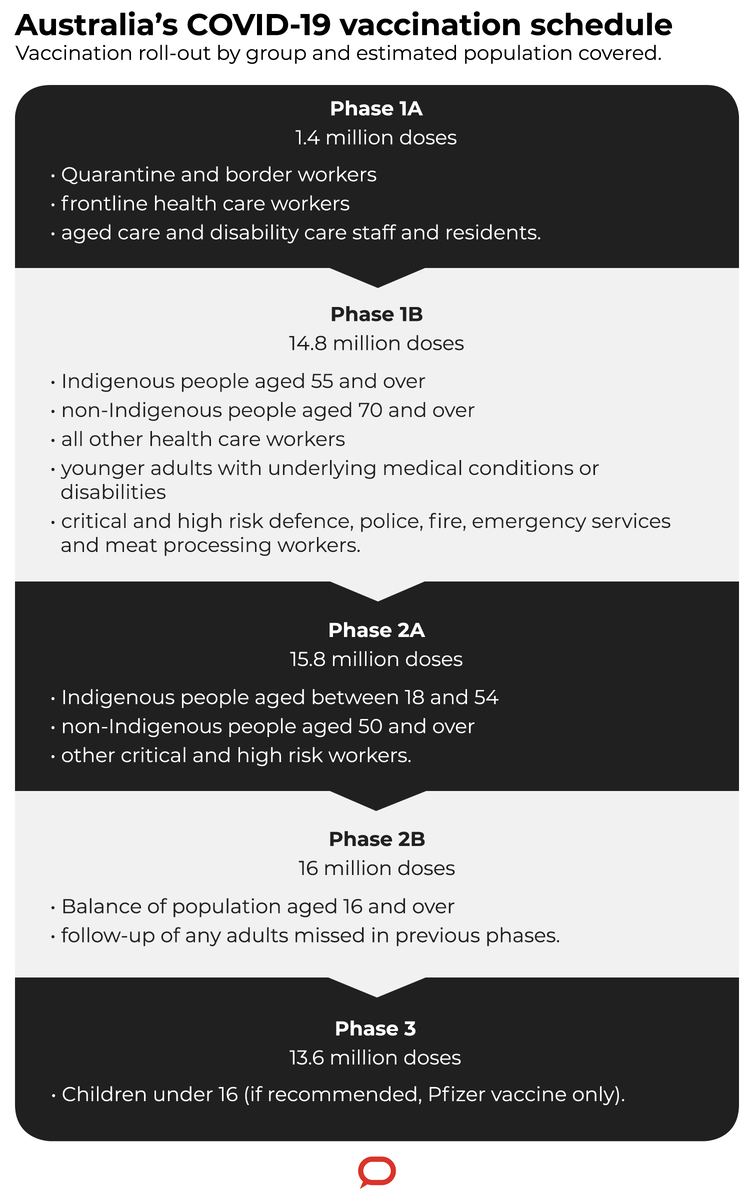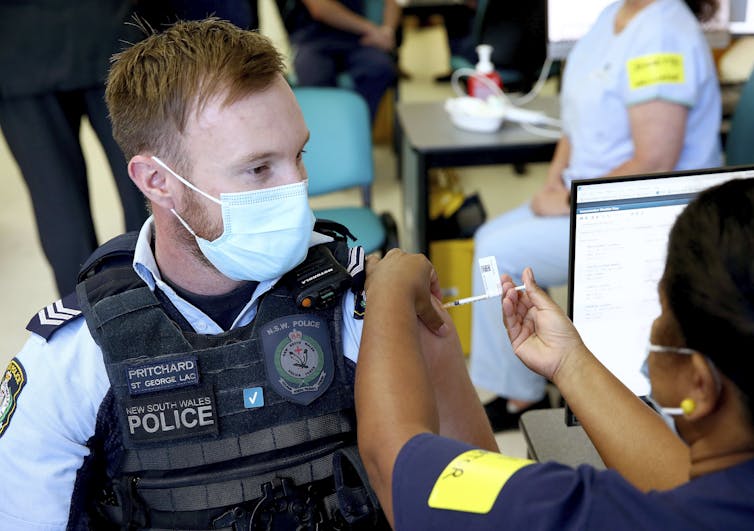Do I need to register for a COVID vaccine? How will I know when it's my turn? Vaccine rollout questions answered
- Written by Natasha Yates, Assistant Professor, General Practice, Bond University
Australia is now more than a week into rolling out the Pfizer vaccine, while AstraZeneca shots are due to start from next week. But many of us may still have questions about when and where we’ll get the vaccine.
Overseas, including in the United States and the United Kingdom, many people have been tricked into “signing up” and even paying for vaccines, then discovering they’ve been scammed.
Experts have warned Australians may start to be targeted now too, so it’s essential we are clear on how this process will (and won’t) play out.
Google trends data suggest Australians have been looking for answers to a few different questions.
Do I need to register for a COVID vaccine?
No. If you’re eligible for a COVID vaccine right now, you will know already. Your workplace (or residence, if you are living in aged or disability care) will have given you the option of having it, although you may still be waiting for your turn to actually get jabbed.
The vaccine currently being rolled out (Pfizer’s mRNA vaccine) is both expensive and tricky to administer. That’s why workplaces are being careful to give it only to those in the highest risk category (1A), and not to waste the shots by allocating supplies to people who may be eligible but don’t want them.
 The Conversation, CC BY
So everyone who is eligible should have been offered a vaccine already — and given the chance to decline it — to minimise any waste.
It’s possible at some point the rest of us will be able to register online, so we can be notified when our turn arrives. But the details around any system like this are not available yet.
Be very cautious of anyone texting, emailing or offering you the chance to register for the vaccine or to skip the queue. It could be a scammer wanting your personal details, or your money.
How will I know when it’s my turn to get the vaccine, and how will I be contacted?
A quick and easy way of checking if you’re eligible right now, or when you will be, is to go to this federal government eligibility checker. Even if you know you’re not eligible at the moment, you can use this tool to find out what category you’re in (1B, 2A, etc). Then you can watch out for information specifically relating to your category when it opens up.
At this stage, we haven’t been told exactly how we will be contacted when it’s our turn to receive a vaccine, or if we will be contacted at all. But we do know the government is planning to run large public health education campaigns with clear instructions as the rollout continues.
Read more:
Just the facts, or more detail? To battle vaccine hesitancy, the messaging has to be just right
Where will I go to get the vaccination?
Currently vaccinations are being given through workplaces (mainly hospitals) and in aged-care homes.
But once vaccines are available for more of us, the plan is to offer them through a range of venues. For example, general practices across the country are putting in huge amounts of time and effort to ensure they’re appropriately set up to deliver COVID vaccines, and can therefore be approved by the department of health as providers.
This means hopefully a number of people will be able to have their COVID-19 vaccine administered by their usual GP, or at least a GP in their local area. Other possible locations include community pharmacies and GP-led respiratory clinics, but these services are still in the planning phases too.
The Conversation, CC BY
So everyone who is eligible should have been offered a vaccine already — and given the chance to decline it — to minimise any waste.
It’s possible at some point the rest of us will be able to register online, so we can be notified when our turn arrives. But the details around any system like this are not available yet.
Be very cautious of anyone texting, emailing or offering you the chance to register for the vaccine or to skip the queue. It could be a scammer wanting your personal details, or your money.
How will I know when it’s my turn to get the vaccine, and how will I be contacted?
A quick and easy way of checking if you’re eligible right now, or when you will be, is to go to this federal government eligibility checker. Even if you know you’re not eligible at the moment, you can use this tool to find out what category you’re in (1B, 2A, etc). Then you can watch out for information specifically relating to your category when it opens up.
At this stage, we haven’t been told exactly how we will be contacted when it’s our turn to receive a vaccine, or if we will be contacted at all. But we do know the government is planning to run large public health education campaigns with clear instructions as the rollout continues.
Read more:
Just the facts, or more detail? To battle vaccine hesitancy, the messaging has to be just right
Where will I go to get the vaccination?
Currently vaccinations are being given through workplaces (mainly hospitals) and in aged-care homes.
But once vaccines are available for more of us, the plan is to offer them through a range of venues. For example, general practices across the country are putting in huge amounts of time and effort to ensure they’re appropriately set up to deliver COVID vaccines, and can therefore be approved by the department of health as providers.
This means hopefully a number of people will be able to have their COVID-19 vaccine administered by their usual GP, or at least a GP in their local area. Other possible locations include community pharmacies and GP-led respiratory clinics, but these services are still in the planning phases too.
 Frontline workers are among the first in line to receive the vaccine.
Toby Zerna/AP
You’ll almost certainly need to make an appointment, regardless of where you’re going to get the jab.
And it’s important you receive two doses of your COVID-19 vaccine at least three weeks apart for the Pfizer vaccine, and at least four but ideally 12 weeks apart for the AstraZeneca vaccine. So on the day you have your first one you may be asked to make an appointment for your follow-up dose.
Read more:
3 ways to vaccinate the world and make sure everyone benefits, rich and poor
While you wait…
While most of us still haven’t been told when or where we will receive the COVID-19 vaccine, hopefully this helps answer some questions.
In short, if you are eligible right now, you will know it. If someone is trying to get you to “register” for the vaccine, they are probably a scammer.
Keep your eyes open for government-produced information about your personal category. Hopefully many Australians will be able to be vaccinated by their local GP or somewhere else just as convenient for them.
While we wait for our turn, there are some things we can do to get ready. For example, we can make sure our details are up to date with Medicare.
For people with chronic health conditions, it may be wise to visit your usual GP to discuss your personal needs and questions around the vaccine, rather than trying to do this once it’s your turn to get vaccinated.
Read more:
COVID vaccine consent for aged-care residents: it's ethically tricky, but there are ways to get it right
Frontline workers are among the first in line to receive the vaccine.
Toby Zerna/AP
You’ll almost certainly need to make an appointment, regardless of where you’re going to get the jab.
And it’s important you receive two doses of your COVID-19 vaccine at least three weeks apart for the Pfizer vaccine, and at least four but ideally 12 weeks apart for the AstraZeneca vaccine. So on the day you have your first one you may be asked to make an appointment for your follow-up dose.
Read more:
3 ways to vaccinate the world and make sure everyone benefits, rich and poor
While you wait…
While most of us still haven’t been told when or where we will receive the COVID-19 vaccine, hopefully this helps answer some questions.
In short, if you are eligible right now, you will know it. If someone is trying to get you to “register” for the vaccine, they are probably a scammer.
Keep your eyes open for government-produced information about your personal category. Hopefully many Australians will be able to be vaccinated by their local GP or somewhere else just as convenient for them.
While we wait for our turn, there are some things we can do to get ready. For example, we can make sure our details are up to date with Medicare.
For people with chronic health conditions, it may be wise to visit your usual GP to discuss your personal needs and questions around the vaccine, rather than trying to do this once it’s your turn to get vaccinated.
Read more:
COVID vaccine consent for aged-care residents: it's ethically tricky, but there are ways to get it right
Authors: Natasha Yates, Assistant Professor, General Practice, Bond University





